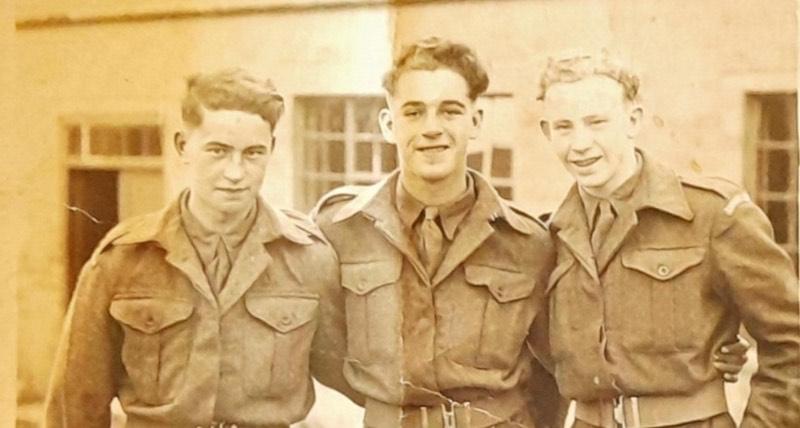
As the threat of war in Europe loomed by the late 1930s, the Anderson Committee published a report on evacuation in July 1938, which prioritised schoolchildren and mothers with infants. It was deemed better value for these evacuees to be billeted in private homes in safer, ‘reception’ areas of the country, rather than building special camps. Hosts in these areas could face a fine if they refused to take an evacuee.
Railway staff, local police, and teachers all helped to shape these plans, which were largely ready by the summer of 1939.
On the 3rd September 1939, Britain and France declared war on Nazi Germany.
Two days earlier, on 1st September 1939, the government had initiated Operation Pied Piper, which would see the evacuation of over 1.5 million people from urban 'target' areas, of whom 800,000 were children.
This is the story of one of our own local lads, Ken Moat.
Ken, a sprightly 94-year-old was born in 1929 in Bentinck Road, in the West End of Newcastle upon Tyne.
Ken was 10 when war broke out and as part of Operation Pied Piper, was evacuated to Kirby Lonsdale with his elder brother.
Both boys lived on Nether Hall Farm where they were looked after by the farmer and his family who Ken said were very good to them both.
Life on the farm could be hard but from Ken’s recollection, it was enjoyable. He went to school when the weather was good and also helped on the farm with the hens and cows.
He was fed well on the farm with eggs, potatoes, tomatoes, porridge and bacon. By his own admission, he didn’t feel the hardship suffered by those in the major cities.
There wasn’t much to do in the area and Kendal, 10 miles to the North-West, was the nearest major town.
Ken and his brother remained on the farm for nearly a year before being returned home in 1940 / 1941 at the request of their mother.
This was a common occurrence at the time with many mothers going against Government policy.
Many children did not remain long in reception areas. By January 1940, around 900,000 evacuees had returned to target areas, despite government calls to 'leave the children where they are'.
It was when Ken moved back home that he felt the impact of war more acutely. Subjected to rationing, it was a luxury to have eggs and bacon with a queue at the shop if he wanted fruit. Ken felt it much harder having had a lot. Times were hard then.
Ken quoted that the meals he ate on the farm would have fed him for a week back home.
Ken was brought up by his mother. His father, a Veteran of World War 1, had left the family home to live in Glasgow.
Ken recalls the bombings, the air raids and the deafening sound of the Anti Aircraft guns firing at the German Bombers. It should be remembered that the Vickers factory was only a couple of miles from Ken's home.
He recalls the balloons in the sky to deter German bombers and, following the raids, he and his friends would go out and collect the shrapnel.
His house wasn’t damaged during the war. A large solid building with many rooms, Ken would go into the cellar during the raids.
Elswick Road School was just down the road from Ken’s house and this is where Ken was taught. It was a tough school where teachers were handy with the strap when pupils were naughty, and evenings, after school, were spent knocking around the streets, making bogies and, as previously stated, collecting shrapnel.
In 1943, age 14, Ken left school and began working for Brough’s the Grocer in Newcastle. It was here that Ken met his childhood sweetheart, Celia.
Ken didn’t really feel the impact of the war at a young age. He said there was often talk between friends about joining up but they were all too young.
He remembers D-Day and the parties that followed, recalling a great community spirit.
He would follow the news and used to draw Spitfires. He remembers the hardship of the Battle of Britain and that Vickers was a main target so the area was regularly bombed.
He remembers the elation of VE Day and the happiness of all around him.
In 1948, Ken left Brough's, having been conscripted into the Army. Staff and friends chipped in and bought him a leaving present, a cigarette case and lighter.
When being conscripted, Ken was asked who he wanted to serve with and said, 'The Army'. At 18 years of age, Ken began training with the Royal Signals at Catterick Garrison.
He later travelled to Barnard Castle where he passed his driving course for cars and four-tonne trucks, later utilising these skills when posted to Germany.
Based near Dusseldorf, Ken continued driving and recalls the area as very clean, no litter and not displaying signs of war. The rules were strict on public transport as he recalled when being told in 1951 “Rauchen Verboten” whilst smoking on a public tram.
Serving for two years, Ken left in 1950 and resumed work with Brough’s, delivering groceries until, aged 40, he began work with North Tyneside Council as a grass cutter where he remained until retirement.
Ken joined the Territorial Army when he left the Royal Signals and stayed in for a couple of years.
In 1959, Ken Married Celia. They remained together for many years, celebrating 60 years of marriage in 2019.
Sadly, Celia passed shortly afterwards.
Ken, now residing in North Tyneside sheltered accommodation still displays a treasured photo of Celia and a beautiful family card celebrating his Diamond Anniversary. He is extremely proud of the fact he received a congratulatory card from Queen Elizabeth II in 2019.
